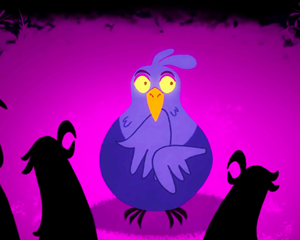This is a little bee-eater's nest. But this is not a little bee-eater chick.
这是一个食蜂鸟巢。但这并不是一只小食蜂鸟。
It's a newly hatched honeyguide -- and it's much more lethal.
这是一只刚孵出的蜜?,它的致命性要高得多。
When its mother placed it here, she punctured all the other eggs in the nest.
母亲把它放在这里时,刺穿了巢里所有的蛋。
However, one little bee-eater chick survived the attack and is now hatching.
然而,一只小食蜂鸟在这次袭击中幸存下来,现在正在孵化。
Although the honeyguide nestling is still completely blind, it instinctively stabs the little bee-eater chick with its sharp, hooked beak.
虽然蜜?仍然完全看不见,它还是本能地用它锋利的钩状喙刺死了小食蜂鸟。
And over the following weeks, the host parents devotedly care for the hatchling that murdered their offspring.
在接下来的几周里,宿主父母全心全意地照顾着将它们的孩子杀死的小蜜?。
This is but one example of brood parasitism, an evolutionary strategy in which one animal tricks another into rearing its young.
这只是巢寄生的其中一个例子,它是一种动物欺骗另一种动物为自己养育后代的进化策略。
It's especially well-known among birds. By depositing their eggs into a stranger's nest, brood parasites are able to shift the major costs of parenting onto others.
在鸟类中尤其常见。通过把蛋放在宿主的巢里,寄主能够将养育子女的主要成本转移到宿主身上。
Brood parasite chicks usually hatch early, then monopolize their host parents' attention.
寄生的幼雏通常很早孵化,之后就独占宿主的照料。
Some stab their fellow nestlings to death, while others shove the remaining occupants out of the nest.
有些会刺死其它的雏鸟,有些则会将剩下的居住者挤出巢。
Meanwhile, others are less harmful to their hosts. Not all brood parasites kill all of their host's offspring outright.
与此同时,其它寄主对宿主的危害较小。并不是所有的寄主都会杀死宿主的所有后代。
Brown-headed Cowbirds usually outcompete them by begging for food louder, more frequently, and with a wider mouth.
褐头牛鹂选择用自己的大嘴竞争,通过更大声、频繁地乞讨食物来战胜对手。
Among the most benign, black-headed ducks lay their eggs in other nests to be incubated.
其中最温和的,莫过于黑头鸭把蛋产在其它巢里孵化。
However, a few hours after hatching, they simply saunter off. But in the most egregious cases of brood parasitism, why don't host parents take a stand?
然而,孵化几个小时后,它们只是溜达着离开。但是在巢寄生最恶劣的情况下,为什么宿主不表态?
In fact, hosts will often drive adult brood parasites away from their nests, and many take their defenses further.
事实上,它们通常会将成年的寄主驱赶出巢,许多宿主还会采取进一步的防御措施。
But whether a hosts can recognize and reject parasitic eggs and nestlings seems to depend on a few factors.
但是它们能否识别并拒收寄主的蛋和雏鸟似乎取决于几个因素。
Eastern phoebes will accept a Brown-headed Cowbird's speckled egg into their nest, though theirs are pure white.
东菲比霸鹟会收容褐头牛鹂的斑点蛋,虽然它们自己的蛋是纯白色的。
The gray catbird, on the other hand, is an expert at rooting out the very same parasites.
另一方面,灰猫嘲鸫是铲除同一类寄主的专家。

It memorizes what the first egg in its nest looks like, which is usually its own, and tosses any aberrations.
它会记住巢中第一个蛋的样子,通常是它自己的蛋,并抛出任何异常的蛋。
This retaliatory adaptation can fuel an evolutionary arms race where brood parasites evolve eggs that closely mimic their host's.
这种报复性的适应助长了进化的“军备竞赛”,寄主进化出了与宿主非常相似的蛋。
Interestingly, birds that do reject parasitic eggs are usually clueless when it comes to parasitic chicks.
有趣的是,那些会排斥寄主的鸟类通常对寄生的雏鸟一无所知。
Reed warblers are good at ejecting poorly matching cuckoo eggs. But if one hatches in their nest, they'll care for it even after it's grown six times their size.
芦苇莺擅长逐出品相异常的杜鹃蛋。但如果有一只杜鹃在巢中孵化,即使它长到了自己的六倍大,芦苇莺还是会照顾它。
Though chick rejection is a rarer phenomenon, there are some noteworthy examples.
虽然拒收雏鸟是很罕见的现象,还是有一些值得我们注意的例子。
While incubating its eggs, the Australian superb fairy-wren sings to them, imparting a unique note that its chicks use as a kind of password.
在孵蛋的时候,澳大利亚的壮丽细尾鹩莺会为雏鸟唱歌,赋予它们一种独特的音符密码。
When a cuckoo is in the wren's nest, it hatches first and pushes the others out.
杜鹃在鹩莺的巢中时,会先孵化,然后将其它的鹩莺挤出去。
But, perhaps because it hatched sooner, the cuckoo chick wasn't able to learn the password, and so it doesn't croon the right begging call.
但也许是因为它孵化得更快,杜鹃雏鸟没有学会密码,因此它不会哼唱正确的音符。
At this point, the adults usually abandon their nest and start another. Altogether, host species show a remarkable variety of responses.
在这种时候,成鸟通常会离开鸟巢,并建立一个新巢。总之,宿主们表现出了非常多样化的反应。
This seems to partially be a result of how long brood parasitism has been in their environment, and thus how much time they've had to evolve suitable adaptations.
这在一定程度上似乎是取决于巢寄生进入它们生活环境的时间,即意味着它们有多少时间进化出适应的能力。
In fact, studies have shown that those hosts that reject parasitic eggs less frequently can visually distinguish between their eggs and a brood parasite's.
事实上,研究已经表明,那些能够拒收寄主的蛋的宿主,很少能从视觉上区分两者。
They simply lack a response to the visual information. This is probably because, before brood parasitism appeared, responding would have likely had no adaptive value.
它们只是对视觉信息缺乏反应。这可能是因为在巢寄生出现之前,反应没有适应性价值。
And even when hosts do recognise a parasite, getting rid of it may not be the best option.
即使宿主能够识别寄生者,处理掉也可能不是最好的选择。
The host, especially if it's small, might not be able to kill the parasite -- or could risk breaking its own eggs in the process.
宿主,特别是小型宿主,可能无法杀死寄生者--或者在这个过程中有打破自己的蛋的风险。
Unless the brood parasite kills all of the host's young, it may be best to simply foster the imposter.
除非所有雏鸟都被寄生者杀死,最好的方法还是抚养这个冒牌货。
Brood parasitism tends to evoke horror and disdain. But why should it be thought of as any more objectionable than predator-prey relationships?
巢寄生往往会引起人们的恐惧和鄙夷。但是,为什么它就应该比捕食者与猎物的关系更令人反感呢?
And is it ever productive to impose human morals onto other animals? Or does it end up saying more about us than it does them?
把人类的道德观强加于其它动物身上,有什么好处吗?还是它最终描述的其实更多是我们自己?
Whichever way you swing it, brood parasitism is yet another example of the fascinating turns evolution has taken.
不管你怎么想,巢寄生都是一例令人着迷的进化的转折。


